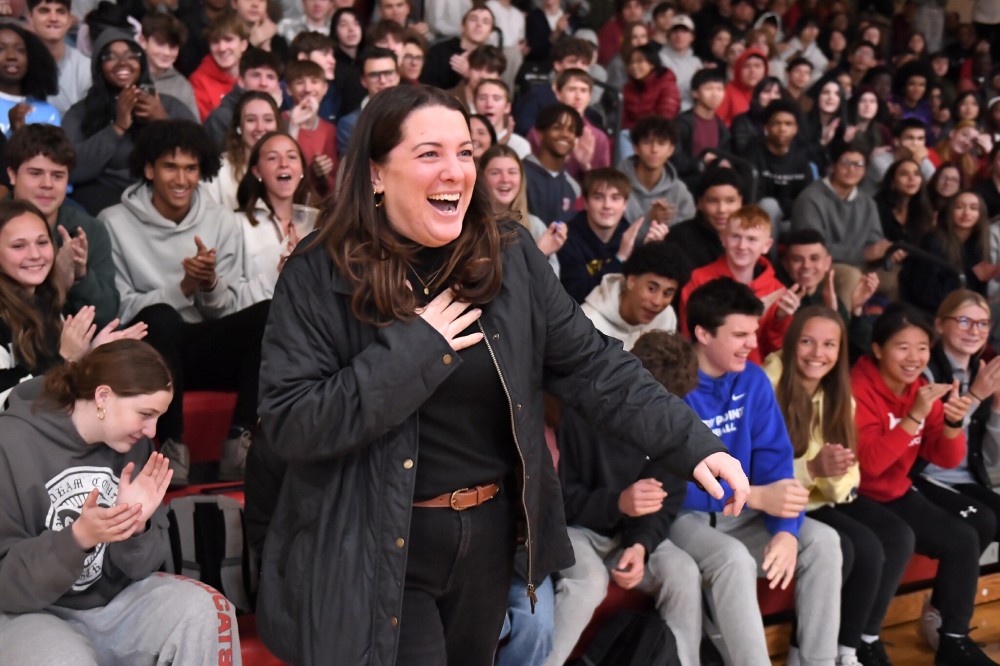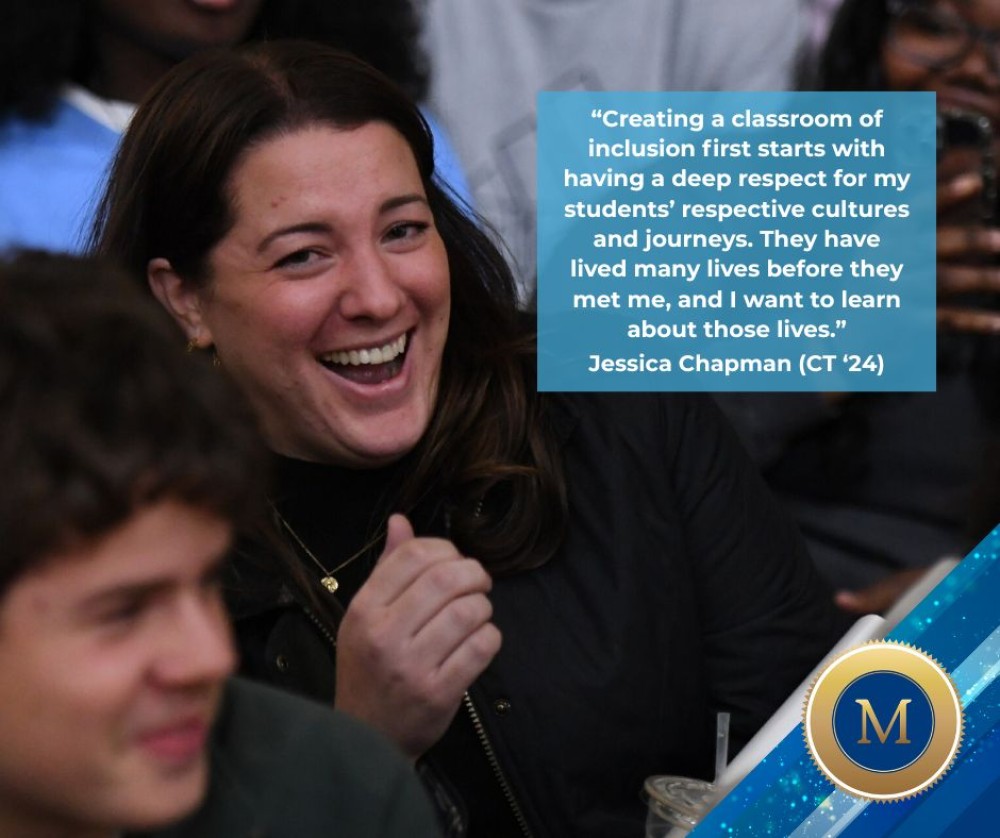Spotlight: Jessica Chapman (CT '24)
May 22, 2025
Connecticut Milken Educator Jessica Chapman (CT ‘24) is a ninth through 12th grade teacher at Norwich Free Academy. Chapman creates an inclusive, inspiring social studies classroom for her students to thrive. Her tailored curriculum engages everyone from multilingual learners to college-credit seniors, sparking curiosity and global responsibility. Chapman received a 2024-25 Connecticut Milken Educator Award in Norwich on November 12, 2024.
Milken Family Foundation: How have students responded since your Milken Educator Award surprise?
My students were incredibly excited for me and continue to be. They loved all of the photos from L.A. and hearing about the other educators I met along the way. For Teacher Appreciation Week, one of our administrative assistants, Evelyn Smith, created “woot woot” carts, where she rolled around buildings with goodies for us. Over her karaoke machine she was heard yelling, “I say ‘Milken,’ you say ‘Chapman’,” and all of my students continued this chant with her for several minutes. It was a lovely movement of feeling celebrated and valued in my role by my students and the adults on campus, much like my notification.
MFF: Who are your role models as an educator?
My colleagues are my role models. I learn from them daily and I’m inspired to continue in my work. I’m surrounded by veteran Milken Educators, several Teachers of the Year, and School Counselors of the Year. I’m privileged to work with them and am inspired by them daily.
MFF: Tell us about your first year of teaching. What memories stand out? Who or what helped you through it?
My first year of teaching was incredibly difficult, erring on the side of terrible. I was a novice teacher who had many new teacher bumps along the way. I had to figure out a classroom management style that was authentic to me. That took me years to develop. Every book I read started with a mentality of “go in hard and ease up along the way,” and that is not who I am. I look back at those first years and wish I could do them over after how much I’ve learned about myself and what it takes to motivate teenagers.
My close friends and family got me through it. I have an exceptionally tight group of friends who are an extension of my family, none of whom are teachers. They would always be interested in my days and offered me different points of view. I’m grateful for them for hanging with me while I learned to truly love my profession.
MFF: What do you hope students remember from their time with you?
I hope they remember that they were valued, seen, and that I will always be in their corner. I hope they also remember to use their voice, and if able, use that voice to advocate for someone who may not be able to advocate for themselves.

MFF: You have differentiated instruction masterfully to reach beginning multilingual learners, with many of your students being new to the country. How have you focused on creating a classroom of inclusion for multilingual learners?
Creating a classroom of inclusion first starts with having a deep respect for my students’ respective cultures and journeys. They have lived many lives before they met me, and I want to learn about those lives. I want to know what holidays they celebrate, what dances they enjoy, and what folktales they grew up with.
It is followed up by having an asset rather than deficit mindset. Some approach multilingual learners with a “what they can’t do” attitude. I say, let them show you what they can do, and you’ll be blown away. I have students who speak four languages and hope to be doctors. They aspire to increase the quality of care for millions, and that’s something to be in awe of.
MFF: You also created a college preparatory sociology course that allows dual-enrollment students to earn college credit through the University of Connecticut’s Early College Experience (ECE) program. How have you seen this impact students’ confidence and ambition to pursue higher education?
ECE courses increase equity and access to a collegiate education. Students at my school have the opportunity to earn enough credits to complete their entire freshman year of college for very little money. This levels the playing field a bit for kids who may have felt that college was financially out of reach for them.
MFF: What advice would you share with people who are interested in becoming teachers?
The advice I’d share is to find your village. Find the people on campus who have been where you are and who have survived it. Find a mentor, teacher, counselor, friend or administrative assistant who lights up a room and makes you laugh when you may want to cry.
Teaching is difficult, but we can’t be scared of that. Rather than it turning us away, we need to let it call us in. Having a strong support system at your school and at home makes the difficult days feel better.
MFF: Are you working on any interesting initiatives or new projects these days? Is there anything else you want to share about your school?
I will be piloting an instructional coaching role at my school next year to support our teachers in differentiating for our multilingual students. I’m so thankful that my school has provided me this opportunity, and am so excited to be able to work more closely with my colleagues.
Don’t miss any new articles and updates from Milken Educator Awards:


